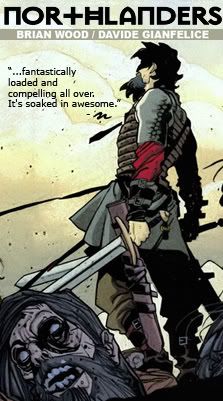An interesting post has gone up over at Ink Destroyed My Paintbrush which I felt compelled to respond to. Here are some excerpts from that article, followed by some of my own thoughts. What do you think?
"There is a popular thought process that Jim Shooter was the perfect cheerleader for: the notion that the comic must be basic enough for anyone to read, after all, "Any comic could be someone's first comic." An attitude that has been championed by more than a few people in the business. Recently, however, I've had reason to rethink the old canard."
"Unfortunately, over the last couple decades, what we've seen are a far greater number of comics that become the 'last' issues rather than 'first' issues. Comics have been losing numbers in droves, so making the point that we have to potentially sacrifice the complexity of story or storytelling so as not to drive away a potential new reader, may well be moving us in the wrong direction. We may have been actively pushing away the reader who is constantly looking for something to grow with them.
It does make sense, for instance, to keep the "every issue a first issue rule" when you look at the industry demographic/marketing plan through the 1940s to 1960s: your comics were targeted towards the same age range, so instead of moving upwards with a person's age, you had to hope to replace the same number of readers that "age out" with a similar number that grow into reading your books. Already there are flaws with the system, when you look at birth statistics during the baby boomer years. Without new product to go along with your new kids, you really have no hope of expanding your market."
"So here's what we do: we don't continually tie the hands of creators. We have books that are not meant for the 6 year old, or the 12 year old, but for the adult. And we make sure that we have books at that 6 year old level that don't insult their intelligence. My almost 7 year old daughter is already telling me what the theme of a movie or book will be in the first third of the story. She understands subtext without knowing what that word means yet. We don't need to keep the material within the medium stupid.
Challenge me. Make me think. Keep me awake. Keep me buying. Or that next comic might be my last."
-Ink Destroyed My Paint Brush -view-
Some interesting thoughts here. I went away from comics for quite a while, during which time I went to school, grew up, focused on developing a career in television, the written word and other storytelling media before coming back as a comic reader in the last few years. Looking at this industry and assessing its evolution over the time I was away I notice a lot of trends. One of these is the growing division between two groups in the comic market, and therein many of the creators as well. One group see comics as a powerful storytelling medium and want to see it explored in order to be used as effectively as possible to meet those ends. Others, are so enamored with the history of comics that they see evolutions as devolutions when often.....the first group would disagree.
Tally me in with the first group. History is important in all things, and having an understanding of it is essential toward grasping what's happening / has happened / may happen and what it all means. Surely, we must be aware of history and consult it when shaping the present. This doesn't mean, however, that certain historical practices or approaches should be regarded with such reverence that the medium is never given the chance to truly spread its wings. Too much dedication to history and we miss the lesson, leaving us to continuously stick our heads up the same asses time and time again. Gross and redundant.
People have an image of 'comic books,' they aren't willing to part with. They have a nostalgic relationship with an expression that appealed to their small constituency of friends and peers and that the world-at-large just didn't get. I can understand that. I feel a kinship with comic fans of older generations that can take happiness and inspiration from those cheesy old stories. My college buddies couldn't understand what we see in those old issues and that's sort of a special feeling we share as a collective. That shouldn't suggest though, that comics as a story-form should avoid changing and growing to where it can appeal to those people who previously didn't get it.
Isn't it more satisfying to have new series that really illustrate the power of the medium (e.g., Criminal, Fables) that you can show to people who don't read comics and have them come out of the experience saying, "Whoa, I had no idea." These are the types of books (Fables is a great example) that are bringing new readers to comics, and these titles are hugely dependent on their linear nature and accumulated character building over time. Imagine if every issue of Fables was entirely un-reliant on things that had come before? It would become meaningless. Sure, everyone would be able to pick it up as their first comic and follow along but all it would do is confirm their preconceptions about the shallow nature of the medium. Personally, Fables was the series that brought me back, and what excited me and kept me reading wasn't that the first issue I read was so enjoyable (it wasn't really) it was that there was the implication of a greater story to be developed and expanded upon. A constant universe to be perpetuated and built into something truly worth investing time and interest into.
He's right, people aren't stupid. His seven year old has been barraged by more culture, stories, ideas, concepts and theories by that age than can even be calculated. This newest generation's ability to understand subtleties and arching messages are way more developed than any youth before them. They don't want to be treated like idiots any more than I do as an adult. I love to be challenged, and believe it or not so do children. In a world that puts so much stock in personal achievement and where knowledge and intelligence more and more help some people define themselves and their worth in such a place - why not give them a product that speaks to these aspirations?
Remember, kids today have ridiculous access to video-games, movies, and the Internet to give them boobs, bad-guys, monsters, flashes, punches, explosions, and all other forms of adrenaline pumped I-just-got-my-first-erection chaos. They don't turn to comics for this type of wide eyed excitement anymore. Sensationalist entertainment has graduated and moved on from comic books, at least insofar as readers are concerned in their consumptions. We need comic creators who understand this, and who aren't trying to write what they would have loved as a child because frankly that just isn't the market any longer. Not with people wailing on each other or accidentally blowing themselves up on YouTube.
We need more creators and editors that still come from the older generations of comics, or at least get it, but that aren't hampered by their worship of classic forms that may be tirelessly dated.
-Tom
Welcome to Newseed
Thanks for finally showing up! Now that you're here, involve yourself in the conversation. Judge, condemn, praise and otherwise debate in the comments. It's important you do this or the system will fail and they will win.
Quote us, link us, bring us glory! It's in your interest.
Quote us, link us, bring us glory! It's in your interest.
Tuesday, September 4, 2007
The Industry
This occured at
5:16 PM
Because of
Anonymous
![]()
Labels: Exposition
Subscribe to:
Post Comments (Atom)







1 comment:
This is a whole lotta 'right'
Post a Comment